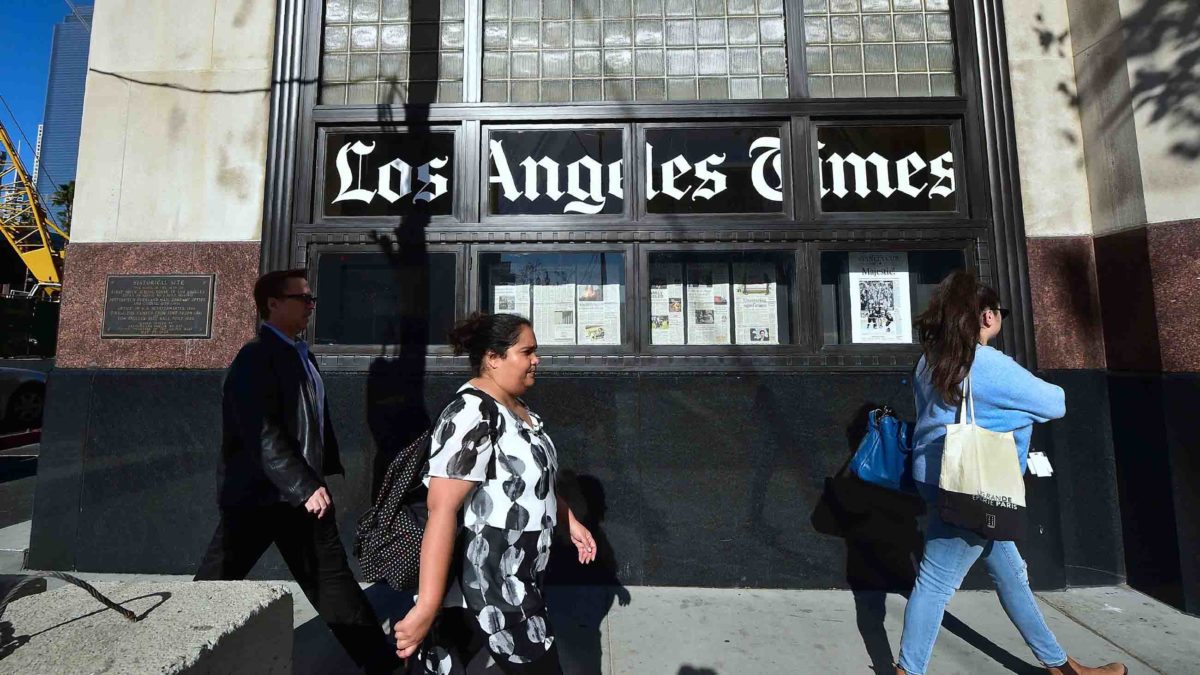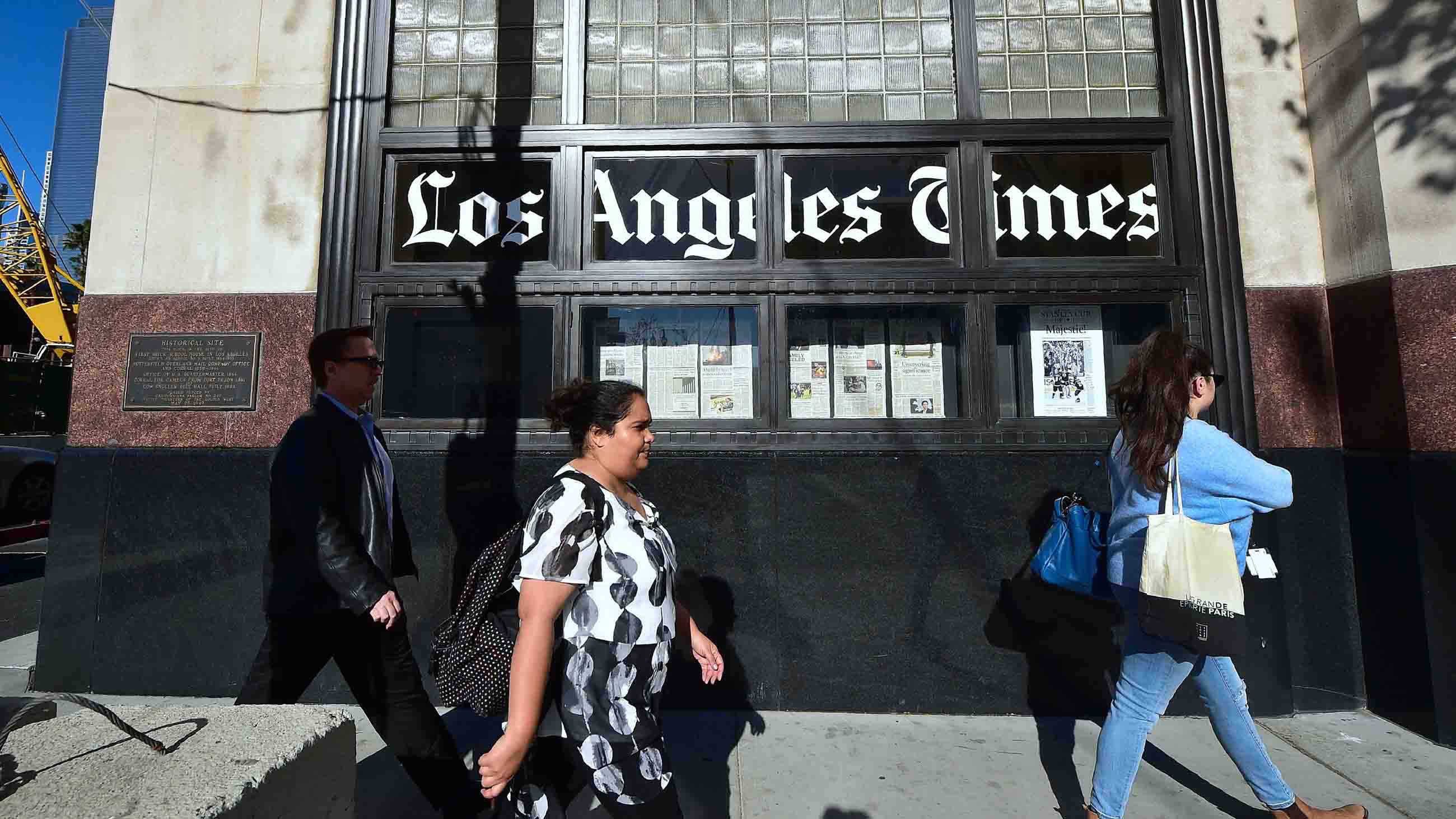In the coming weeks, The Los Angeles Times will return to local ownership for the first time in nearly two decades. The $500 million sale (which includes several other papers) to California billionaire Patrick Soon-Shiong was cheered by journalists at The Times on Wednesday, who have for months clashed with management over issues ranging from complaints about a series on the Walt Disney Company’s influence in Anaheim to the firing of a top financial editor.

Wednesday’s sale of The Los Angeles Times was largely welcomed by newsroom staff. But the paper’s new billionaire owner has faced his share of controversies.
Visual: FREDERIC J. BROWN/AFP/Getty Images
But while Soon-Shiong’s purchase may be a welcome change for the newsroom, the 65-year-old transplant surgeon and entrepreneur has been involved in his own share of controversies.
In 2016, Soon-Shiong launched an effort called the Cancer Moonshot 2020 — just a day before then-President Obama announced his program by the same name. With a focus on immunotherapy, Soon-Shiong laid out plans to enroll 20,000 patients in clinical trials with the aim of getting new treatments approved by the end of the decade. But a 2017 investigation by STAT found that the billionaire’s initiative has made little progress. In fact, the investigation suggested, the moonshot seemed to be a way to drum up business at a time when Soon-Shiong’s companies were taking a dive.
A few years earlier, two former employees of NantHealth, just one of the billionaire’s ventures under the umbrella organization NantWorks, filed a lawsuit accusing the company of being “engaged in a multitude of fraudulent activities.”
Several other investigations have found that Soon-Shiong’s philanthropic efforts often serve to benefit his own companies. Though the billionaire consulted with former Vice President Joe Biden on his cancer initiative and was a donor to Hillary Clinton’s campaign, he also met with Donald Trump to discuss health care in 2016 and was reportedly being considered for a position in the current administration.
Also in the news:
• American conservatives share and read far more fake news than any other political group, according to a new analysis from the University of Oxford in Britain. The study, part of the university’s “computational propaganda project” looked at sharing of junk news stories in the three months before President Trump’s State of the Union Address. They found that right-wingers and Trump supporters shared more fake news than any other group, especially on Facebook. The finding reinforced similar findings on political bias in sharing false stories from last year. (The Guardian)
• During an interview with a local news station in Las Vegas on Tuesday, Environmental Protection Agency administrator Scott Pruitt made the suggestion that global warming may actually be a good thing. Scientists were quick to debunk that assertion, along with several others regarding human impact on climate change and the level of temperature change expected by the end of this century. (Associated Press)
• A recently-published study by the U.S. Geological Survey found agricultural insecticides in 10 rivers that feed into the Great Lakes, after collecting data from the tributaries over an entire year. USGS researchers say the study raises concerns about potential impacts of neonicotinoids on aquatic invertebrates and the aquatic food web. Neonicotinoids have been linked to declines in bee populations, as well as other pollinators. Insecticide manufacturers Bayer and Syngenta have responded to the USGS report saying that the EPA has evaluated and cleared neonicotinoids of any threats to aquatic life. (Bloomberg)
• The most powerful rocket ever launched by a private company blasted into space on Tuesday from NASA’s Kennedy Space Center in Cape Canaveral, Florida. The company, SpaceX, has been ferrying cargo to the International Space Station for years, but this rocket was heavier and its payload was different: SpaceX’s founder, the electric-car mogul Elon Musk, marked the occasion by sending one of his Tesla Roadsters, with a mannequin driver, into orbit around the Sun. “It’s kind of silly and fun, but silly and fun things are important,” Musk said; he hopes a version of the rocket, the Falcon Heavy, can someday carry real humans to Mars. (New York Times)
• In an effort to boost transparency and win over consumers, Mars Inc., the maker of M&M’s and other candies, published its policies on conducting and funding scientific studies for the first time on Monday. Along with distancing itself from advocacy-led studies, the company said it will disclose sponsorship and support studies that can be freely published and available to the public. (Reuters)
• And finally: While not on the level of Gwyneth Paltrow, whose lifestyle company Goop touts the supposed benefits of inserting jade eggs into the vagina or shelling out for “energy-healing” stickers — New England Patriots quarterback Tom Brady does make a variety of dubious health claims about diet and exercise in his recent book, “The TB12 Method.” Among the measures the 40-year-old credits with helping him win five Super Bowls are receiving special massages to promote “muscle pliability” — a concept that does not exist in exercise science — and trying to control the body’s pH level by avoiding certain foods. Not surprisingly, much of Brady’s advice is tied to products for sale on the TB12 website. (Vox)










